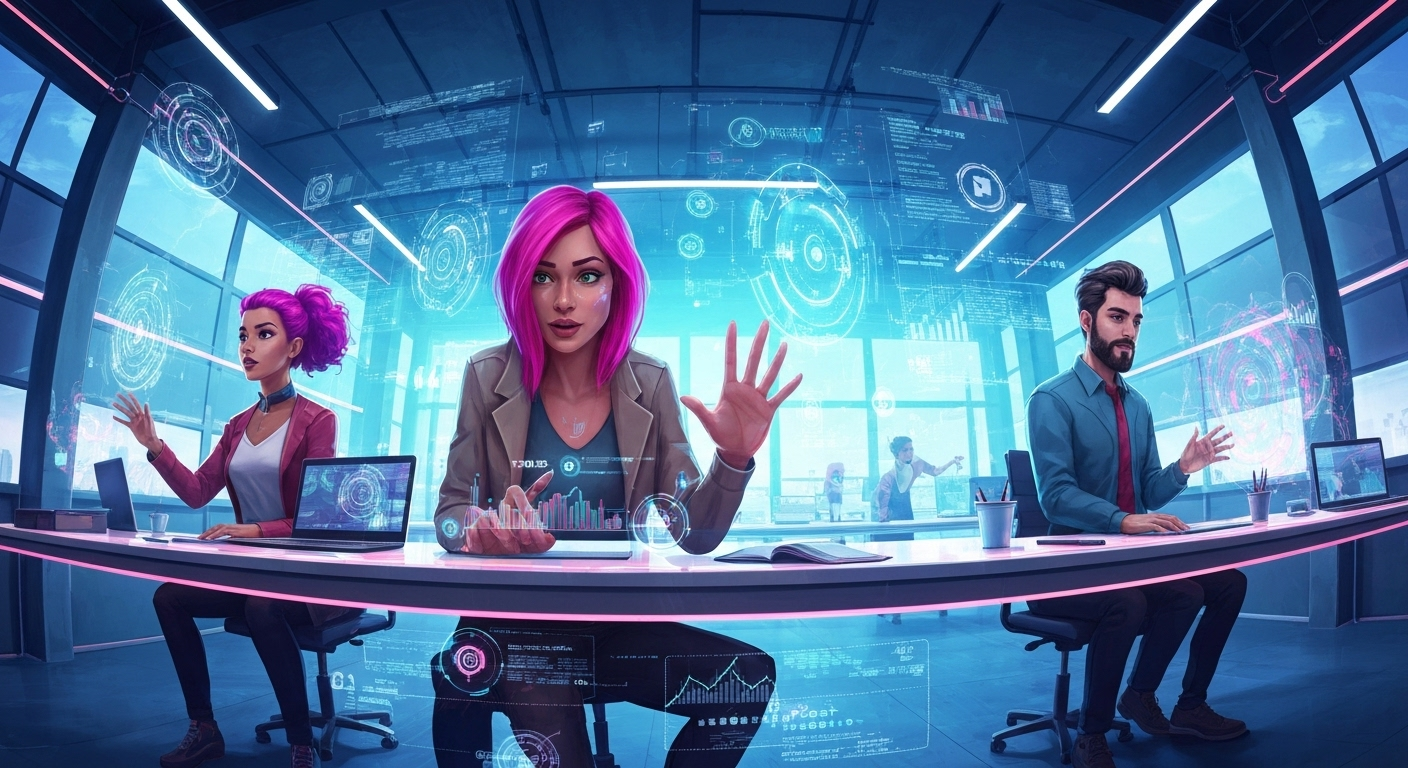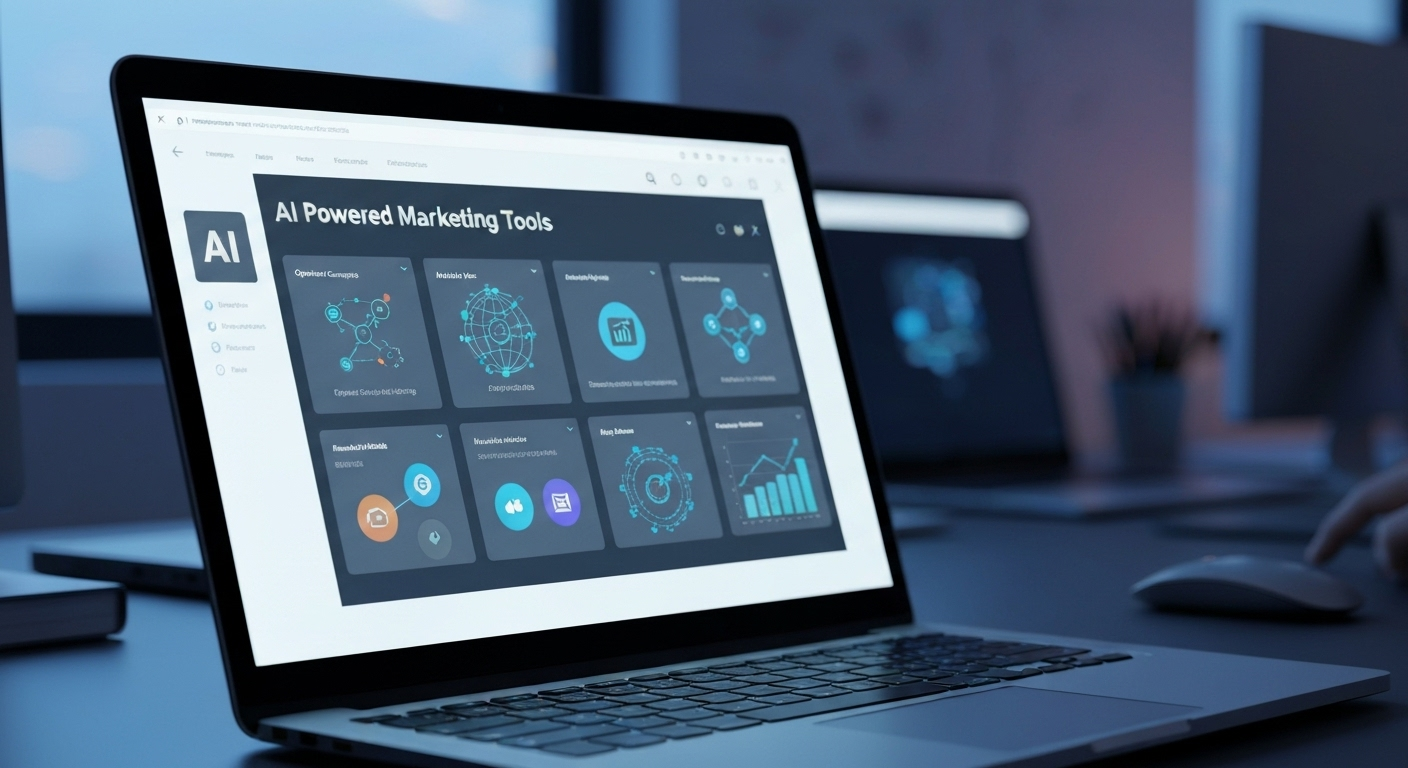August 27, 2025
Latest News Generative AI Digital Marketing May 2025 Updates

Greg Kopyltsov
Founder
latest news generative ai digital marketing may 2025


The world of digital marketing is undergoing a seismic shift in 2025, led by the rise of generative AI and artificial intelligence technologies. Marketers are now harnessing AI tools to automate routine tasks, personalize content, and optimize campaigns with unparalleled speed and precision. As the digital marketing landscape evolves, both opportunities and ethical considerations emerge, challenging professionals to adapt and innovate. This blog explores the latest generative AI advancements and the essential tools redefining marketing success this year.

Generative AI has moved from an emerging trend to a core component of every forward-thinking marketing strategy in 2025. This technology is enabling brands to connect with audiences in smarter, more meaningful ways, driven by data and machine learning. For digital marketers, generative AI means rapid content creation, real-time personalization, and the ability to predict and respond to customer needs instantly.
As marketing trends shift, generative AI’s real-time analytics and automation capabilities are reshaping the digital environment. These new technologies empower marketing teams to streamline workflows, deliver consistent messaging, and engage customers with unprecedented precision and creativity.
Over recent years, generative AI has steadily gained momentum across the marketing industry. Companies like Netflix and Amazon set early examples by using AI to recommend products and tailor user experiences, leveraging historical data and behavioral analysis. Today, generative AI’s impact is felt in nearly every aspect of digital marketing, from automated content generation to social media management and predictive analytics.
The latest developments in 2025 highlight AI’s growing ability to scan massive datasets, identify trends, and craft personalized content on demand. Emerging tools such as ChatGPT, Copilot for Microsoft, and Gemini for Google Workspace offer marketing leaders powerful solutions for everything from campaign planning to customer service automation.
With marketers increasingly relying on real-time insights, the industry is witnessing a fundamental change in how customer journeys are mapped and targeted. The efficiency, creativity, and personalization enabled by generative AI are now critical for staying competitive.
The digital marketing landscape has reached a pivotal moment in 2025. The adoption of AI-driven strategies has accelerated, closing the gap between consumer expectations and brand capabilities. AI-powered tools, once an optional add-on, have become indispensable for executing a successful digital marketing strategy.
Future trends are being shaped by the ability to personalize experiences at scale and to react instantly to changing consumer behaviors. Generative AI not only automates repetitive tasks but also empowers marketing teams to focus on high-value strategy development and creative innovation.
The widespread adoption of AI is propelling businesses toward greater efficiency and stronger customer relationships. “Your job will not be taken by AI. It will be taken by a person who knows how to use AI,” says Christina Inge, highlighting the urgency for marketers to build expertise and embrace new technology for a sustainable competitive advantage.

Generative AI is making digital marketing smarter and more effective in 2025. Artificial intelligence and advanced AI technologies now power content marketing, automate workflows, and provide deeper insights into customer data. Brands use these innovations to personalize communications, craft better customer experiences, and optimize marketing campaigns for maximum impact.
As content generation becomes faster and more data-driven, marketing teams can focus on strategic growth, while predictive analytics enables precise targeting and improved ROI. The next sections examine how AI transforms personalization, campaign optimization, and more.
Personalization in 2025 has evolved beyond simple demographic targeting. Generative AI enables brands to create tailored experiences based on detailed audience segmentation and real-time customer interactions. The customer journey is now mapped with incredible accuracy, allowing for nimble adjustments at every touchpoint.
For example, AI-driven recommendation engines like those at Netflix and Amazon leverage purchase history and browsing behavior to suggest relevant products. This approach not only boosts engagement but also fosters loyalty as customers receive messaging that feels truly relevant.
Marketers can now anticipate and fulfill customer needs, resulting in deeper relationships and higher conversion rates. Predictive analytics further optimize the customer journey by identifying opportunities and addressing pain points before they arise.
AI-driven campaign optimization has become a cornerstone of effective marketing in 2025. Generative AI tools continuously analyze campaign performance, providing actionable feedback for real-time adjustments. This allows marketers to maximize return on investment and hone their marketing campaigns with unprecedented precision.
For example, Insider’s Sirius AI™ uses machine learning to optimize campaign elements, resulting in measurable ROI improvements. “We achieved a 381% uplift in conversion rate for the same budget spend,” shares a business leader, underlining AI’s tangible benefits.
By leveraging data and automation, marketing teams can allocate resources efficiently and focus on high-impact strategies. Campaigns are no longer static—they adapt on the fly to audience feedback, driving stronger results and deeper customer engagement.

A wave of advanced AI tools is revolutionizing marketing automation and machine learning in 2025. Industry leaders rely on platforms that streamline content creation, automate workflows, and deliver actionable insights. Tools like HubSpot, Jasper AI, and Google Marketing Platform have become essential for marketing teams striving for efficiency and growth.
These solutions empower marketers to optimize their strategies, from social media management to predictive analytics. In the next sections, we’ll highlight the leading generative AI tools and explore how new platforms are delivering results for enterprises.
The evolution of marketing automation has been accelerated by powerful AI technologies. Marketers now turn to a select group of generative AI solutions to manage the complexity of modern campaigns and achieve stronger results.
These leading tools integrate seamlessly with existing workflows, enabling adoption of AI across organizations of all sizes. The table below summarizes the standout platforms dominating the market in May 2025:
Tool Name
Key Features
Main Use Case
HubSpot
Ad campaign management, lead tracking, content personalization
Inbound marketing, content management
Jasper AI
Automated content generation, analytics, insights
Blog/article creation, data analysis
ChatGPT
Chatbot creation, lead generation, campaign planning
Customer engagement, social media
Copilot (Microsoft)
Idea generation, drafting, social posts
Marketing plans, automation
Gemini (Google Workspace)
Messaging, data summarization, task automation
Workflow management, reporting
Insider’s Sirius AI™
Predictive analytics, omnichannel automation
Customer journey, campaign optimization
Optmyzr
Pay-per-click management
Digital advertising, paid search
Synthesia
Video creation, campaign personalization
Video marketing, training content
Each solution brings a unique set of AI-powered features, making marketing automation more strategic and impactful than ever.
Alongside established AI tools, new platforms are emerging that are changing how enterprises approach digital marketing. These next-generation solutions combine machine learning, natural language processing, and personalized automation to give digital marketers a distinctive competitive advantage.
Startups and established software providers alike are introducing tools that enable more granular audience segmentation and predictive modeling. Enterprises can now create, test, and deploy targeted campaigns at scale, responding instantly to consumer behavior and market trends.
Digital marketers are leveraging these platforms to craft omnichannel experiences, automate repetitive tasks, and unlock deeper insights from customer data. The result is more agile, responsive marketing that drives measurable business impact and fosters stronger customer engagement.

AI technologies for content creation have advanced rapidly in 2025, giving digital marketers new capabilities for content generation and digital advertising. Automated tools can produce blog posts, articles, videos, and social media content at scale, ensuring messaging is consistent and tailored to each audience segment.
These innovations reduce time spent on production tasks and free up marketing teams to focus on creativity and strategy. The following sections explore how AI is transforming automated writing and enhancing creativity in video and design content.
Blog and article generation has reached new heights with the power of generative AI and natural language processing. Marketing teams can now produce large volumes of high-quality content with minimal manual input, significantly boosting content production efficiency.
AI-driven platforms such as Jasper AI and ChatGPT allow marketers to input prompts or instructions and receive complete, on-brand articles tailored for their target audience. The process speeds up editorial workflows, reduces costs, and enables consistent publication schedules.
With these advancements, content generation is not just faster—it’s more strategic. AI tools analyze audience interests, optimize for search engine relevance, and adapt messaging in real time, ensuring each blog post drives engagement and supports business goals.
Creativity in digital marketing is being redefined by AI-powered solutions for video production, visual design, and social media posts. These technologies enable rapid creation, personalization, and scalability across platforms.
AI doesn’t replace human creativity; it amplifies it by handling repetitive design tasks and allowing creators to focus on concept development. Social media content is now more dynamic and responsive, adapting quickly to trends and audience preferences.
Marketers are leveraging these advancements to stand out in crowded digital spaces, create memorable campaigns, and foster deeper connections with their audience.

Generative AI is driving a revolution in digital advertising and ad campaigns throughout 2025. AI adoption is unlocking new possibilities for targeted messaging, dynamic creative testing, and real-time optimization, giving marketers a strategic edge.
Emerging tools allow for the creation and adjustment of ad copy, images, and videos on the fly, ensuring each campaign resonates with its audience. The next sections detail how dynamic ad creation and real-time insights are transforming advertising strategies for digital marketers this year.
Marketing teams are reimagining ad campaigns with AI tools that enable dynamic ad creation and continuous testing. Generative AI can instantly generate multiple ad variations, adjusting copy and visuals based on audience data and campaign performance.
This automation streamlines the creative process, allowing marketers to quickly test which messages resonate best. AI-driven platforms monitor real-time results and automatically optimize ad placements and content for maximum effectiveness.
Dynamic testing ensures that campaigns remain fresh and engaging, even as consumer behaviors shift. Marketers can respond to emerging trends or feedback immediately, maximizing the potential of every advertising dollar and improving overall campaign performance.
Generative AI’s greatest strength in advertising lies in its ability to deliver targeted messaging backed by real-time, deeper insights. Predictive analytics tools analyze customer data as it comes in, allowing brands to adjust messages instantly for relevance and resonance.
This approach leads to greater customer engagement and higher conversion rates. Digital marketers are empowered to personalize campaigns at scale, using insights to fine-tune creative, optimize budgets, and build stronger brand loyalty—all while staying ahead of competitors in a constantly evolving marketplace.
In 2025, enterprises are not just experimenting—they’re fully embracing generative AI to scale marketing operations and transform their marketing teams. AI-powered tools are streamlining workflows, automating routine tasks, and enabling organizations to compete at a higher level.
By integrating artificial intelligence across marketing channels, companies are driving productivity, improving consistency, and unlocking new strategic opportunities. The sections below explore the practical ways enterprises are maximizing efficiency and innovation through generative AI adoption.
Efficiency is at the heart of enterprise AI adoption in 2025. Generative AI is helping organizations automate and scale operations, freeing marketing teams to focus on high-impact initiatives.
By leveraging these efficiencies, enterprises can handle larger volumes of campaigns, reach wider audiences, and maintain high performance standards.
Scalability means marketing leaders can direct more resources toward creative strategy and customer engagement, confident that routine operations are managed by reliable AI technologies. This balance of automation and innovation is rapidly becoming the norm among industry leaders.
Seamless integration of AI across diverse marketing channels has become a strategic focus for enterprises in 2025. Whether it’s social media, email marketing, digital advertising, or customer support, artificial intelligence provides the glue that unifies campaigns and messaging.
AI-driven platforms synchronize marketing efforts, ensuring that content and strategies align across every touchpoint. This integrated approach enables marketing teams to deliver consistent brand experiences and maintain real-time visibility over campaign performance.
The result is a more agile, data-driven marketing operation. Teams can adapt to changes in audience behavior, market trends, and channel effectiveness, making informed decisions backed by actionable insights. Integration also helps break down silos, fostering better collaboration and innovation across organizations.
Several U.S. businesses are showcasing how generative AI adoption leads to success in digital marketing. These case studies illustrate the practical impact of AI on customer engagement and campaign performance.
Industry leaders are leveraging AI not only for content and campaign management but also to inform strategy development. For example, a healthcare provider integrated conversational AI into their customer service, improving response times and satisfaction scores.
These examples demonstrate that adopting AI technologies can drive measurable business outcomes while enhancing the customer experience.
Digital marketing reports from 2025 provide valuable insights into the impact of generative AI on market trends, statistics, and analyst predictions. These findings reveal how AI adoption is reshaping strategies, boosting efficiency, and driving stronger results for brands in every industry.
Major studies highlight the measurable benefits and future potential of AI-powered marketing, including improved personalization, increased ROI, and data-driven decision-making. The following sections break down the key trends, statistics, and predictions shaping the future of digital marketing.
2025 marketing reports identify several future trends that are defining the use of AI in digital marketing:
Marketing teams are now expected to use AI for everything from content generation to audience segmentation and campaign optimization. This evolution requires continuous learning and skill development, as organizations prioritize both human creativity and technological expertise.
Analysts note that companies not embracing these trends risk falling behind competitors. The successful use of AI is now synonymous with data-driven marketing leadership and long-term business growth.
2025 statistics make the case for generative AI’s significant, measurable impact on digital marketing. According to recent industry reports, AI-driven campaigns deliver higher engagement and conversion rates compared to traditional methods.
For instance, predictive segmentation has produced conversion rate increases as high as 381% for some brands. Automated content creation has also doubled organic search traffic for marketers utilizing these tools. The McKinsey report estimates that generative AI could contribute $2.6 trillion to $4.4 trillion annually in productivity gains across industries.
These figures underscore the importance of adopting AI technologies—not only to save time and resources but to drive business performance. As marketing budgets shift toward AI-powered platforms, companies are tracking and reporting success using robust analytics and customer data.
Analyst predictions for generative AI in digital marketing are overwhelmingly positive for 2025 and beyond. Experts forecast rapid adoption across both small businesses and large enterprises, changing the nature of customer engagement, content production, and advertising.
Industry thought leaders expect continued innovation in hyper-personalization, natural language processing, and data-driven insights. As AI models become more sophisticated, brands will unlock new capabilities for creative storytelling and real-time strategy adjustment.
“AI will shape the future of marketing,” says Melissa Russell, emphasizing the role of skilled marketers in driving successful adoption. The consensus is that organizations investing in AI today are securing a strong advantage for the coming decade, ensuring they can meet evolving consumer expectations and stay ahead in a competitive marketplace.

Generative AI offers a host of new capabilities for digital marketing in 2025, from deeper insights to enhanced personalization and real-time data analysis. Marketers now have access to tools that not only automate content creation but also enable hyper-targeted segmentation and conversational AI.
These innovations help brands deliver richer, more relevant experiences at every stage of the customer journey. The next sections explore how real-time analytics, advanced segmentation, and AI-powered customer engagement are transforming marketing outcomes this year.
Real-time data analysis has become a cornerstone of effective marketing, thanks to advances in artificial intelligence and tools like Google Analytics. Marketers can now monitor customer behavior, campaign results, and emerging trends as they happen, making immediate adjustments for optimal outcomes.
AI technologies process vast amounts of data, uncovering patterns that might otherwise go unnoticed. These insights inform decisions on content generation, ad targeting, and customer engagement, ensuring that every action is backed by accurate information.
With up-to-the-minute analytics, marketing teams can identify underperforming campaigns, test new strategies instantly, and seize opportunities as they arise. This agility is essential for maintaining a competitive edge and delivering results in a fast-paced digital landscape.
Hyper-personalization is one of generative AI’s standout achievements in 2025, enabling marketers to address customer needs with unprecedented accuracy.
Predictive analytics further enhance segmentation, forecasting customer actions and allowing brands to adjust campaigns proactively. Marketing teams now craft individualized experiences across every channel—email, social media, and beyond—building stronger connections and boosting retention.
These capabilities set a new standard for customer journey optimization. Brands that adopt hyper-personalization are seeing higher conversion rates and more meaningful relationships with their audiences.
Conversational AI has transformed how brands interact with customers in 2025. Virtual assistants and chatbots now handle inquiries, provide recommendations, and guide users through purchasing decisions in real time.
These tools not only streamline customer support but also personalize each interaction, drawing on customer data to deliver relevant responses. Businesses can automate two-way conversations across channels such as websites, messaging apps, and social media platforms.
AI-powered engagement builds trust and loyalty by making customers feel understood and valued. Marketing teams can collect feedback, resolve issues quickly, and nurture relationships—all without the delays of manual intervention. As conversational AI matures, its role in customer engagement and retention will only grow stronger.
Creators and agencies are setting a new bar for content excellence in 2025 by embracing AI-powered solutions. These technologies streamline content production, enhance creative output, and help marketing teams adapt to ever-changing digital landscapes.
AI-driven video production and design tools are empowering creators to experiment, iterate, and reach audiences more effectively. The following sections detail how video creation powered by AI is inspiring new storytelling methods and expanding the possibilities for digital marketers and creative professionals alike.
Video production is undergoing a transformation as generative AI takes center stage in 2025. Automated video creation tools can turn scripts, data, or even simple prompts into polished, branded videos for marketing campaigns.
AI-driven platforms like Synthesia allow creators to generate explainer videos, ads, and training content at scale. By automating labor-intensive production tasks—editing, scene selection, and voice-overs—these tools enable agencies to focus on storytelling and strategy.
The result is higher-quality, more diverse video content that resonates with target audiences. Whether for product launches, educational series, or social media campaigns, AI-powered video production gives marketing teams the flexibility and speed needed to stand out in a crowded digital environment.
Creating compelling visual assets requires a seamless transition from early prototypes to final designs. Utilizing generative AI tools enables marketing teams to quickly iterate on concepts, fostering creative exploration without sacrificing quality. Advanced machine learning algorithms refine visuals based on audience segmentation and behavioral insights, ensuring that the designs resonate with target users. By automating routine tasks, teams can focus on strategic elements of content production, enhancing overall creativity. Understanding the impact of these technologies on the design process allows marketers to deliver engaging customer experiences while maintaining brand consistency across various digital platforms.

The integration of generative AI within marketing continues to raise important ethical considerations. Issues surrounding data privacy are at the forefront, especially as brands leverage AI technologies to personalize customer experiences. Additionally, bias within AI algorithms can lead to unfair advantages in audience segmentation and targeting, impacting marketing campaigns. Transparency is crucial; stakeholders must understand how AI tools generate content and insights. Responsible usage of these technologies requires human oversight to maintain authenticity and ethical integrity, ensuring that marketing teams enhance customer engagement without compromising trust or fairness in their digital marketing strategies.
Implementing generative AI in digital marketing brings significant implications for data privacy and security. As businesses harness AI tools for content creation and customer engagement, ensuring the protection of sensitive consumer data remains paramount. Adopting robust security measures and adhering to ethical considerations is vital in promoting trust within the target audience. Marketing leaders must stay abreast of regulatory changes and incorporate privacy-focused practices into their digital marketing strategy. By prioritizing data security, organizations can mitigate risks and enhance customer experiences, fostering lasting relationships built on transparency and responsibility.
Ensuring fairness in AI algorithms is crucial for the integrity of digital marketing efforts. Bias can inadvertently skew marketing campaigns, leading to misrepresentation of product recommendations and customer behavior predictions. By analyzing historical data and leveraging machine learning, marketing teams can identify these biases, ultimately improving audience segmentation and targeting. Incorporating ethical considerations into AI tools promotes transparency, enabling marketers to build trust with their target audience. As industry leaders prioritize fairness, the reliance on real-time analytics and predictive capabilities can drive more equitable customer experiences in marketing strategies.
Transparency in generative AI usage remains crucial for marketing professionals aiming to build trust with their target audience. Adopting clear guidelines ensures that AI tools operate within ethical boundaries, fostering accountability in marketing campaigns. Marketing teams can enhance content creation by providing insights into their AI processes, allowing for honest communication about data utilization. Responsible usage of AI technologies not only mitigates risks associated with data privacy but also aligns with evolving customer expectations. Establishing robust frameworks around AI implementation paves the way for deeper insights that respect individual customers and drive meaningful engagement.
Implementing generative AI presents various challenges for marketing teams, particularly regarding integration with existing martech stacks. Ensuring seamless collaboration between AI tools and current systems requires a strategic approach, as businesses strive to enhance their digital marketing strategies. Balancing automation with human creativity is crucial; embracing AI shouldn't replace the human element, especially in customer engagement. As AI adoption increases, managing the phenomenon of AI fatigue becomes essential. Digital marketers need to maintain focus on delivering value through personalized customer experiences, utilizing predictive analytics to inform their decisions and strategies effectively.
Incorporating generative AI into established martech stacks significantly enhances digital marketing strategies. This integration allows marketing teams to leverage AI tools for seamless content creation, improved audience segmentation, and optimized email marketing campaigns. The synergy of AI technologies with existing platforms facilitates better predictive analytics, enabling real-time adjustments to campaigns based on customer behavior insights. Moreover, using machine learning algorithms can streamline routines, such as customer support and data analysis, driving efficiency. The result is a comprehensive customer journey that not only meets but anticipates individual customer needs while maximizing the competitive advantage in an evolving digital landscape.
Navigating the interplay between AI tools and human creativity requires a thoughtful approach. Marketers must recognize the phenomenon of AI fatigue, which can occur when reliance on generative AI diminishes engagement and stifles innovation. Prioritizing human-AI collaboration enhances efficiency without overshadowing human input. Utilizing real-time data analytics, marketing teams can implement machine learning models while ensuring that human oversight remains pivotal. By embracing a hybrid strategy, digital marketers can harmonize technology with creativity, driving impactful marketing campaigns that resonate with the target audience and foster enriching customer experiences.
Looking ahead, the synergy between generative AI and customer engagement is set to redefine digital marketing strategies. By leveraging artificial intelligence and machine learning, campaign personalization will reach new heights, ensuring that customers receive tailored content at the right time. Techniques like predictive analytics will empower marketing teams to anticipate consumer behavior, enhancing user experiences across social media platforms and email campaigns. As brands continue to embrace innovative AI tools, they will cultivate deeper insights into audience segmentation, ultimately leading to more effective customer interactions and strengthened relationships.
Understanding consumer behavior is essential for effective marketing strategies. Advanced AI tools leverage machine learning algorithms to analyze vast amounts of consumer data, identifying patterns and trends that human marketers might miss. By utilizing real-time insights, brands can create targeted marketing campaigns that resonate with their audiences. Predictive analytics enables the anticipation of customer needs, leading to personalized product recommendations and tailored content that enhance the overall customer journey. As digital marketers adopt these technologies, they gain a significant competitive advantage by staying ahead of evolving market trends, ultimately fostering deeper customer engagement.
The transformation of marketing processes through AI technologies showcases a remarkable evolution in human-AI interactions. These collaborations enable marketing teams to leverage machine learning for predictive analytics, enhancing audience segmentation and content creation. As AI tools become more sophisticated, they facilitate deeper insights into customer behavior, allowing for more tailored marketing campaigns. Human oversight remains essential, ensuring that digital marketers maintain the creative and ethical dimensions of strategy development. This symbiotic relationship fosters improved customer engagement and supports marketing automation, ultimately revolutionizing how brands connect with their target audience.
KeywordSearch has an AI Audience builder that helps you create the best ad audiences for YouTube & Google ads in seconds. In a just a few clicks, our AI algorithm analyzes your business, audience data, uncovers hidden patterns, and identifies the most relevant and high-performing audiences for your Google & YouTube Ad campaigns.
You can also use KeywordSearch to Discover the Best Keywords to rank your YouTube Videos, Websites with SEO & Even Discover Keywords for Google & YouTube Ads.
If you’re looking to SuperCharge Your Ad Audiences with AI - Sign up for KeywordSearch.com for a 5 Day Free Trial Today!
Navigating the evolving landscape of digital marketing necessitates a nuanced understanding of generative AI. By harnessing these AI tools, marketing teams can enhance content production, streamline customer engagement, and achieve deeper insights into consumer behavior. However, as digital marketers embrace these innovations, it is imperative to prioritize ethical considerations and maintain human oversight to ensure responsible usage. As we anticipate the latest news in generative AI, the path forward will be shaped by our ability to balance technological advancements with ethical responsibility, ensuring that marketing strategies are both effective and trustworthy in 2025.
In 2025, top generative AI tools for marketers include advanced content generation platforms, personalized email automation systems, and powerful data analytics software. These tools enhance campaign effectiveness, streamline workflows, and foster deeper customer engagement by leveraging AI's capabilities to understand and predict consumer behavior.
AI-driven personalization enhances campaign results by delivering tailored content to individual users, leading to increased engagement and conversion rates. By analyzing consumer data and preferences, businesses can create relevant experiences that resonate with their audience, ultimately driving brand loyalty and maximizing ROI.
To use generative AI responsibly, businesses should prioritize data privacy by implementing robust security measures, foster fairness in algorithms through diverse datasets, and promote transparency with clear usage policies. Engaging stakeholders in ethical discussions further ensures responsible AI adoption and mitigates potential risks.